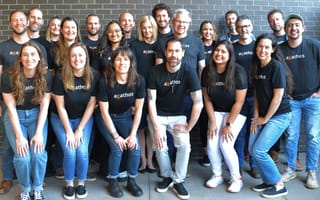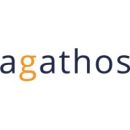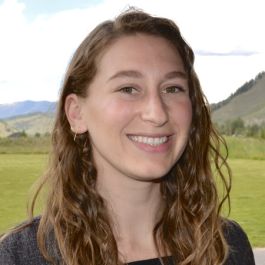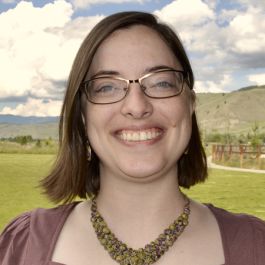Over twenty species of birds have bitten Natasha Hagemeyer. Cardinals, tufted titmice, woodpeckers, a peregrine falcon. Even an owl.
But it was all in pursuit of data, tagging birds to collect information about their social behavior as a field researcher in a Ph.D. program. In the process, Hagemeyer worked “cheek to jowl” with her team on expeditions to remote locations, crossing streams on rotten logs, grappling with rain-soaked equipment, struggling with strange sleep schedules, and surviving sweltering heat and awkward moments alike. In such brutal conditions, transparency with her colleagues was unavoidable.
After an experience like that, Hagemeyer craved that same level of transparency in her post-academic career. It’s one of the values she deeply appreciates about the team at Agathos, where she now works as a data scientist. She gets all the data and openness without the biting birds.
“In the field, everything is out in the open. You can’t do weird, secret stuff when you are working at field sites with four or five other people,” said Hagemeyer. “I was really attracted to that environment, where people are open about mistakes and collaborate to fix them.”
It’s something she’s seen “time and again” at Agathos, a healthtech company that captures data to help reduce clinical variation in providers’ practice patterns. The company promotes transparency, which may be why it seems to permeate every facet of the business.

Externally, Agathos’ data transparency helps provide clinical guidance. Hagemeyer noted it inhibits “weird habits” of providers to help improve patient outcomes. In action, that might mean a provider who orders three times as many blood samples as their colleagues sees the data and reconsiders their approach, saving patients from superfluous needle pokes and waiting for irrelevant lab results.
Internally, the company seeks to champion openness through actions such as adopting pay transparency. Built In connected with Hagemeyer and two of her colleagues to learn more about how these practices impact their experience working at Agathos.
The year is 2020. On screen, Full-Stack Engineer Ezra Ablaza is fluidly spinning two 28-inch wooden kali sticks around his head. The Filipino martial arts weapons blur in his laptop camera as he weaves them dangerously around the room, discussing the ways each move benefits his body.
Following along in the Zoom squares on his computer are his colleagues. Product Owner Chelsea Berman wields chopsticks, while Hagemeyer silently bonks herself on the head using an empty paper towel tube.
As someone who joined Agathos in the middle of the Covid-19 lockdown, Ablaza fondly remembers this chance to host one of the team’s weekly “teach-ins” as a defining moment: “It was difficult to stay focused and in high spirits at the time. Talking about what kept us sane was really beneficial.”
Hear what else Ablaza had to say about the environment at Agathos:
On transparency in healthcare: Our head of variation reduction at Agathos is a medical doctor, and he often says that a lot of the ills and high costs of healthcare come from variation in clinical practice. What we do here is not just interesting from an analysis perspective, but also in terms of how identifying these inefficiencies can translate to savings in time and effort.
On organizational transparency: A transparent culture sets the precedent for better work. If your boss is comfortable saying, “I’m stressed the heck out and need to take a break,” that shows you it’s okay to acknowledge stress, which exists in every working environment, and that it’s okay to take a break or vacation. It helps you stay on top of your life and health and still be able to work at your full capacity. You can also better trust the feedback you are getting. Because I often get feedback on how long it takes to review things, I can ask for help without feeling uncomfortable. I can trust what I’m being told and act on it.
On diverse hiring: The wider you cast your net, the more different people will apply, even beyond the traditional dimensions of race and gender. Look at the three of us: None of us got degrees for our exact positions, but here we are, and we’re pretty dang good at our jobs. Excellence can come from anywhere. At Agathos, we have diversity in education, background and age — and age discrimination in tech is huge.
On how to succeed at Agathos: Be prepared to make an impact. We are transitioning from being super scrappy to more sustainable, so be prepared to slow down and think. That means we want a cycle and infrastructure that works; we want to simplify processes. Be prepared to learn something outside of your wheelhouse.
“I can ask for help without feeling uncomfortable. I can trust what I’m being told and act on it.”
Chelsea Berman comes from a family of physicians and continued to surround herself with them throughout her career. At Agathos, she started in customer success before pivoting to product ownership: “When I was on the customer success team it was so different from any other company I’ve ever seen, where client-facing professionals are territorial over their relationships. At Agathos everyone is collaborative and transparent.”
Now, she helps guide the development of features, apps and infrastructure to ensure customers use the data available to them. In addition to her product duties, she is part of a group dedicated to planning fun events and activities for the team, such as quarterly off-sites. “We always make sure there is an element purely for fun, and that the business element is really collaborative,” she said.
On transparency in healthcare: It’s not part of physicians’ everyday life to share their practices. But we allow them to have transparent conversations with their peers — people they trust who work with a similar population — and they can trust the data Agathos provides. They can engage in interesting conversations about how to practice medicine. It’s not top-down; you’re giving people who make these decisions raw data for themselves.
On inclusion: Diversity looks a bit different here because we are so small, but one of the things we have done at Agathos is open up different communication channels so that all voices can be amplified, even if the person is not an extrovert.
On the culture: As a team, we connect about things outside of the job and get to know each other so everyone can be themselves at work. Aside from the teach-ins, which are a great way to get to know each other, we also have quarterly off-sites where we see each other in person.
On how to succeed at Agathos: Everyone has a voice. Working here means that you are welcome to advocate for something you believe in, challenge assumptions and ask why. We’re not looking for a robot. Get ready to be creative and solve new problems. We value curiosity and continuous learning.
“Working here means that you are welcome to advocate for something you believe in, challenge assumptions and ask why.”
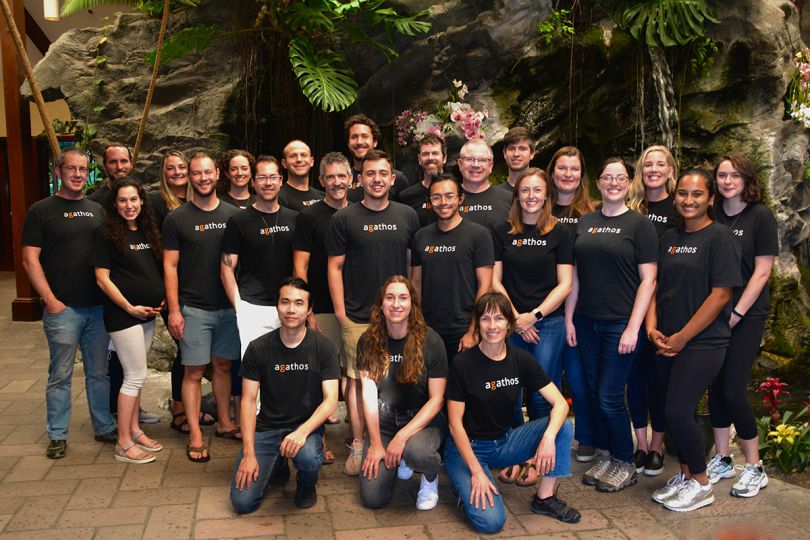
Before pivoting to data science, Hagemeyer learned analysis on the fly through the millions of tiny data points created by the tags she placed on birds as a field researcher. In her current role, she builds complex analyses and investigations on her quest for healthcare insights.
But none of this would be possible without the incredible support of her team. “When I got Covid-19, I became bed bound and was on oxygen for weeks. I had a microstroke; it was like I got hit by a bus,” she said. “It took months to come back. Everyone in the company was enormously supportive — they bent over backwards.”
This treatment isn’t an outlier. Hagemeyer said Agathos does the same for anyone, including those on parental leave. And that support isn’t only reserved for crises; the team loves to lift each other up for wins, too. “We celebrate each other. We do it for promotions, and even people who move on — we’ll throw them a party. We are just really supportive of each other,” she said.
On transparency in healthcare: Everything is digitized at hospitals, so there is a wealth of data. As often happens with data collection, we’ve started accumulating it faster than we know what to do with it. At the hospital or physician group level, it can be hard to see what is going on. Doctors are extremely busy and, especially in hospitals throughout Covid-19, they are completely overwhelmed. Agathos provides a window into that, allowing physicians the ability not to just look at performance, but their own individual data in narrow slices. This allows them to change things that they might not realize they are doing differently. It’s very easy for humans to slip into habits or behaviors we wouldn’t do if we gave it some thought. With the right data, we see variability between physicians decrease. This especially improves care in hospital settings, where patients are handed between different individuals. The more alike those individuals are practicing, the more effective and consistent healthcare can be.
On organizational transparency: When people make mistakes here, the reaction is, “How do we fix this?” Recently, I worked on something for several months and discovered that we had mismatched copy and what we were sending to clients was wrong. It wasn’t a big issue, but there were errors. Still, there wasn’t any reason to point fingers; we just sat down as a team to figure out where the errors were coming from. We also realized it was a manual process and came up with a solution to prevent it from happening again. We know to expect mistakes because we’re all human.
On pay transparency: As one of the people officers here, part of my role is to share employee feedback on policy changes. I was deeply involved in pay transparency discussions and learned it’s really easy to be biased without knowing it. There are so many studies that show that even the tiniest details on a resume can bias decisions, even down to the sports you play. We are strange, pattern-matching creatures. The easiest way to avoid hidden biases is to stick everything out in the open. Also, for a lot of people, negotiating salary can be an emotional nightmare. This takes that stress away. Plus, it’s a good way to put our money where our mouth is.
On the potential for data scientists: There is a lot of data in healthcare, and there are a lot of questions to answer. The amount of trust in this data is really high, as long as you do some level of verification. Hospitals are obsessive about making sure their data is accurate, because people’s lives depend on it.

